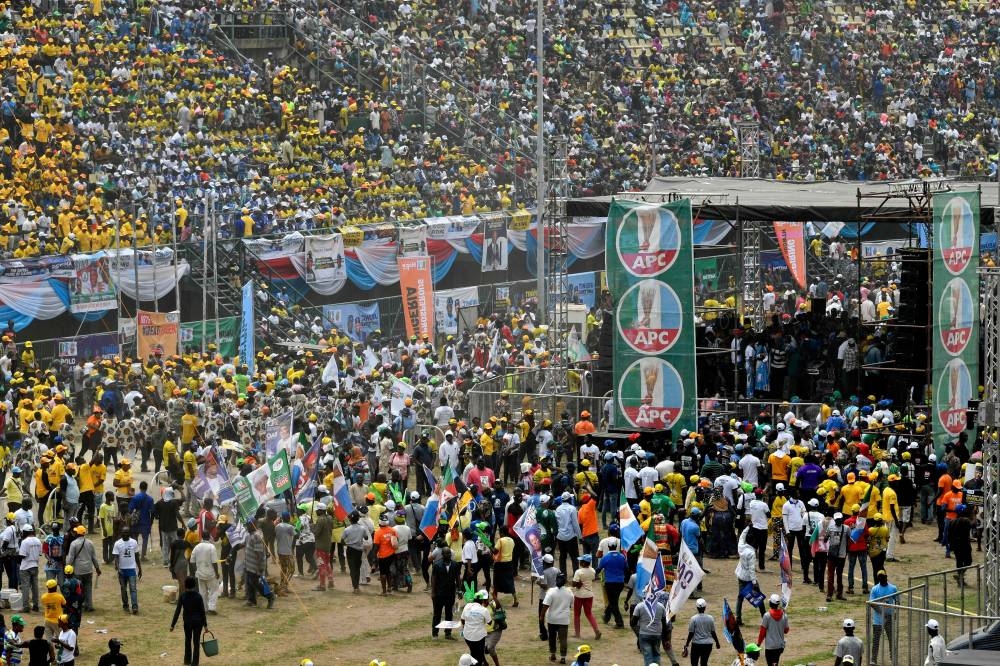AFP - Nigeria, which elects a new president on Saturday, is one of Africa's richest and most vibrant nations but is dogged by corruption, Islamist violence and a cost-of-living crisis.
Here are key facts about the country:
- Land of two halves -
West Africa's economic powerhouse, Nigeria is the continent's most populous country with around 215 million inhabitants.
By 2100 it is forecast to be the world's second most populous country, with Lagos the biggest city on the planet.
Home to about 250 ethnic and linguistic groups, Nigeria is almost evenly split between a Muslim north and a Christian south.
As many as four in 10 Nigerians live below the national poverty line. Many Nigerians -- especially in the country's north -- also lack education and access to basic infrastructure, such as electricity, safe drinking water and sanitation, according to the World Bank.
- History of dictatorships -
Modern-day Nigeria was historically home to independent kingdoms and city-states, which were affected by the European slave trade from the late 15th century.
Colonial power Britain held sway from the mid-19th century and ruled until independence in 1960.
Since independence Nigeria has suffered six coups, leading to decades of mostly military regimes until civilian rule was restored in 1999.
A bid for secession in the mainly Igbo southern region of Biafra led to a civil war between 1967 and 1970 that left about one million people dead.
Outgoing president Muhammadu Buhari, himself a former coup leader, became the first opposition candidate in Nigerian history to defeat a sitting president in 2015.
- Oil wealth -
Last year Nigeria briefly lost its place as Africa's leading oil producer to Angola, as its output fell to the lowest level in decades, largely due to theft from the country's pipelines.
The 2023 budget forecasts increased production of 1.69 million barrels of crude per day, well below the production quota of 1.8 million barrels set by OPEC.
The Covid pandemic plunged Africa's biggest economy into its first recession for four years in mid-2020, compounded by the war in Ukraine which sent inflation spiralling to 20 percent.
The International Monetary Fund has forecast 3.2 percent economic growth in 2023, up from three percent in 2022.
- Boko Haram -
An insurgency by the radical Islamist group Boko Haram has killed at least 40,000 people and displaced more than two million since 2009, according to the United Nations.
In 2014 the group's kidnapping of 276 schoolgirls from Chibok brought the violence to world attention. More than 100 of them are still missing.
In July 2018, Boko Haram split and the Islamic State-backed ISWAP is now dominant in the northeast.
Nigeria's insecurity is also fuelled by a conflict over land and resources between sedentary farmers and nomadic herders, and by spiralling crime in the northwest and centre where bandits are stepping up kidnappings.
- Novels, Nollywood and Afropop -
Nigeria has produced a slew of major authors from Chinua Achebe ("Things Fall Apart") to Nobel-winning playwright Wole Soyinka and feminist novelist Chimamanda Ngozi Adichie of "Half of a Yellow Sun" and "Americanah" fame.
Its film industry, "Nollywood", second only to Bollywood in terms of output, produces some 2,000 films annually.
Nigeria also does a brisk trade in romantic comedies, which it exports across Africa, netting $660 million in revenues in 2021, or 2.3 percent of GDP.
Nigeria is also the home of the jazz-infused music genre known as Afrobeats, made popular by singer and activist Fela Kuti, as well as Afropop megastars such as Burna Boy, Davido and the Grammy-nominated Wizkid. - AFP


